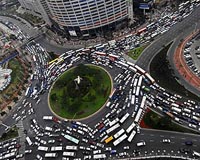 |
Frankfurt, Germany (UPI) Sep 21, 2009 European carmakers are placing different bets to dominate the growing sustainable mobility market. One thing is clear: The world's fossil fuel resources are set to deplete, so people have "no choice but to go for emission-free personal mobility in the future," Dieter Zetsche, chief executive officer of German car giant Daimler, said recently at the Frankfurt Motor Show. The sustainable-mobility market is set to grow significantly, boosted by ambitious national and European emissions reduction targets. Daimler is banking on hybrid cars and electric mobility -- but also on the development of the hydrogen fuel cell. Zetsche hopes to have a fuel cell car ready within the next five years and will launch an EV probably in 2012. Volkswagen is a bit late to the game, with the E-Up set for a 2013 launch. The Wolfsburg-based carmaker, which also owns Audi and soon Porsche, does not push hybrid vehicles too much; it is instead banking on highly efficient diesel and gasoline cars to bridge the transition period to full EVs. Toyota, the Asian carmaker, has a significant head start regarding the hybrid technology, and therefore hopes it can penetrate the European car market with its new plug-in version of the Prius. Probably the most ambitious push into electric mobility is done by Renault. The French carmaker has teamed up with Better Place, the company founded by Israeli Shai Agassi, to snatch first-mover advantage when it comes to EVs. The concept is aimed at extending the limited range of EVs with a network of battery swap stations to be built by Better Place in several countries, the first being Israel and Denmark. In Europe, the Better Place battery-swap model will be first tested in Denmark, a small country with a well-connected road system and a lot of green idealism. "I am convinced that there will be at least half a million EVs on the road in Denmark by 2020," Jens Moberg, the CEO of Better Place Denmark, said earlier this year. "That would be 25 percent of the cars in Denmark." The concept requires a car with a loose, swappable battery (drivers will only lease the battery, significantly reducing the overall cost of the overall car), and Renault has agreed to provide it with the Fluence Sedan, set to spearhead the project in 2011. Aside from said project, the French carmaker is refusing to delve into hybrids and will completely bank on EVs. "I am putting 4 billion euros into electric cars and I have two thousand people working on it," Renault CEO Carlos Ghosn said in Frankfurt. The company unveiled four EVs at the show. Share This Article With Planet Earth
Related Links Car Technology at SpaceMart.com
 Car sales spike in Beijing, capital nears 4 million auto mark
Car sales spike in Beijing, capital nears 4 million auto markBeijing (AFP) Sept 18, 2009 Sales of new cars in Beijing have spiked to about 2,000 a day, a trend that will put up to four million vehicles on the streets of China's capital by year's end, state media said Friday. About 60,100 cars were sold in the month of August in Beijing -- the largest number of auto purchases this year and nearly double the amount of vehicles sold in the same month in 2008, the China Daily said. ... read more |
|
| The content herein, unless otherwise known to be public domain, are Copyright 1995-2009 - SpaceDaily. AFP and UPI Wire Stories are copyright Agence France-Presse and United Press International. ESA Portal Reports are copyright European Space Agency. All NASA sourced material is public domain. Additional copyrights may apply in whole or part to other bona fide parties. Advertising does not imply endorsement,agreement or approval of any opinions, statements or information provided by SpaceDaily on any Web page published or hosted by SpaceDaily. Privacy Statement |